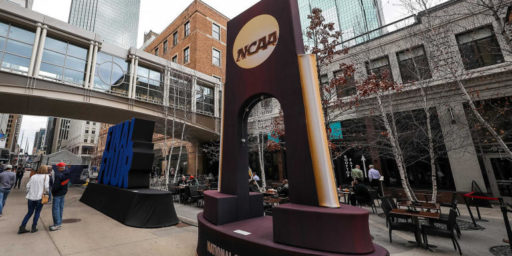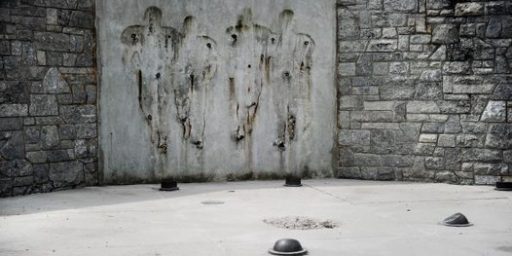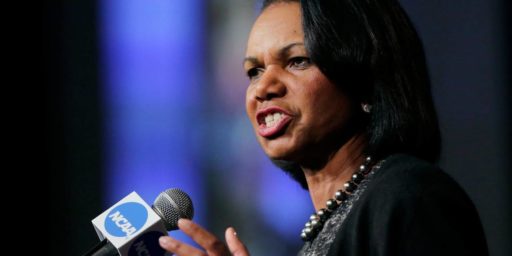NCAA Approves ‘Name, Image, Likeness’ Rights
College athletes are now free to cash in on their fame.

In the wake of last week’s Supreme Court ruling signaling the end of ‘amateur’ college athletics and a slew of state-level laws granting collegiate athletes the right to profit from their “name, image, and likeness,” the National Collegiate Athletic Association bowed to the inevitable:
The Division I Council voted to recommend the Division I Board of Directors adopt an interim policy that would suspend amateurism rules related to name, image and likeness. The board meets Wednesday.
While opening NIL activities to student-athletes, the policy leaves in place the commitment to avoid pay-for-play and improper inducements tied to choosing to attend a particular school. Those prohibitions would remain in effect.
If adopted by the board, the temporary action would remain in place until federal legislation or new NCAA rules are adopted.
It’ll be adopted by the board. And, frankly, “pay-for-play” and “improper inducements” will almost certainly become unchecked under this new policy, at least for sports that attract strong booster interest.
The also issued this guidance in navigating the new rules:
- College athletes can engage in NIL activities that are consistent with the law of the state where the school is located. Colleges and universities are responsible for determining whether those activities are consistent with state law.
- Student-athletes who attend a school in a state without a NIL law can engage in this type of activity without violating NCAA rules related to name, image and likeness.
- College athletes can use a professional services provider for NIL activities.
- Student-athletes should report NIL activities consistent with state law or school and conference requirements to their school.
Again, this is inevitable. It’s good news for the handful of athletes who will be able to profit from this. It’s almost certainly bad news for competitive balance in high-profile sports, notably big-time football and basketball. It’ll likely have no direct impact at all on most athletes playing most sports at most colleges.





“It’s almost certainly bad news for competitive balance in high-profile sports, notably big-time football and basketball. ”
James, as has been pointed out, we don’t have that balance.
And the revenue received should be taxed as income at prevailing rates. Absolutely no carve out for student status.
I’d also consider revoking scholarships for athletes who choose to pursue this route, as they’ll subsequently be well able to afford the cost of their own education. Repurpose those funds to kids who actually need them.
@HarvardLaw92:
With all due respect, Counselor, that’s naive. It’s the scholarship that gets these athletes TO that school. If you’re Andrew Luck or Trevor Lawrence or Eli Manning coming out of high school, you have your pick of Universities which to attend. If one doesn’t give you a scholarship, another school will. And any amount of money made by a student athlete is going to be dwarfed by the amount of money made by the university.
Using entertainment (or your business, the law) as an example, I get paid stupid money for my job. Why? Because I make money for the studio. The studio makes a whole lot more from my labor than they pay me. Much, much, much more. And I’m okay with that. You make stupid money because you make money for your firm. The senior partners make more from your labor than you do. And you’re okay with that.
Universities with strong athletic programs will operate the same way. Finally.
@EddieInCA:
I take it you don’t believe work should be its own reward, and asking to get paid, much less decently paid, is base and cruel and completely sullies the sanctity of your labor? 😉
@Barry:
A handful of schools are more competitive than others in football and basketball, up to a point.
Still, the NCAA basketball tournament has been held annually, save for 2020, since 1939. Here’s the distribution:
So, John Wooden’s UCLA teams had a dominant run from 1964-1975—but only one title since then. Otherwise, there have been modest dynasties for relatively short periods.
Football is harder, since we didn’t have a playoff until 6 years ago and only had a 1 vs 2 matchup for 15ish years before that. So, multiple teams can claim championships going back to the late 1800s. Regardless, here’s the list:
Of the traditional powerhouses, only Alabama, Ohio State, and LSU have won multiple championships in this millennium.
I suspect College sports will become like A, AA, AAA baseball. AAA will serve as training for the Majors. Schooling and education will be an afterthought and the pretense that these are anything other than professional athletes will be all but dropped.
AA will be full of kids hopeful that that can make it to AAA but cognizant that is a long shot and and even longer to get to the Majors. By their third year hopefully they will accept that they might need this degree after all. If they do stand out, they will be “sent up” to a real program.
A will be the ones in it for fun, but fully cognizant that the degree and some lifelong injuries will be all they have to show for it at the end of their stint.
@MarkedMan:
Maybe that’s for the best but, right now, that’s essentially only true for a relative handful of college basketball players.
Even in big-time football programs, including Alabama, Clemson, and Ohio State, only a handful of athletes get drafted in a given year. Bama and OSU each had 10 players selected this past year, some of whom won’t even make an NFL roster. The odds are incredibly small.
Further, contrary to popular belief, the vast majority of these players go on to graduate. Even at Alabama, which sends an inordinate number of players to the pros comparative to most, the graduation rate is at 93% for the athletic program–and 100% for basketball and 88% for football.
This headline has a “After parole denial, Inmate #1234 elects to remain in prison” aspect to it that amuses me.
@HarvardLaw92:
You (like everyone I’ve heard talk about this) seem to be thinking that it’s only about big names getting big contracts from the likes of Nike or UnderArmor.
I can see a lot of students getting small local sponsorships from “Bobs Autoland” or “Sue’s Sandwich Shop”. It won’t be enough to pay for their education, but it can be a big help in paying for all the things that scholarships don’t cover (clothes, new glasses, car repairs, a nice dinner out with that someone special, etc.).
@EddieInCA:
I think it’s more the reputation of the program and the ability to potentially use that as a springboard to professional sports that gets them there, while the scholarships make their attendance viable. I don’t have a problem with that. It allows a lot of kids who’d otherwise never be able to attend the opportunity to do so.
The way I see it, once they’re getting to cash in on the professional level earnings early, they no longer need the scholarships to fund their education. In a sense, they’re essentially even denying those funds to a kid who does need them for that purpose. Those funds can be redirected to enable some other kid who doesn’t have a marketing deal to attend, or even redistributed to non-athletic scholarships.
We should probably be realistic that the number of athletes and number of schools that might be affected by this is likely to be small though.
@Mu Yixiao:
Fair point. Change my statement to ratably cancel their scholarship in concert with their earnings. Get $500 from Bob’s Muffler Shop, lose $500 in scholarship funding.
@EddieInCA:
Slight clarification: I’m an equity partner, not an associate (we don’t have senior partners, just equity and non-equity, along with some who serve on the management committee.) I absolutely take your point, though. We may potentially be getting close to the point where we need to start thinking about forcing these programs to be split off from their schools and ran like the businesses they in reality are.
@Stormy Dragon:
Indeed. Aside from bowing to the inevitable, what the NCAA did here was establish some clarity and uniformity. NIL rights have been passed by several state legislatures and the recent SCOTUS decision makes it likely that they will stand judicial scrutiny. It would obviously be unfair competitively for schools in some states to have NIL rights and others not. So, the NCAA is getting out in front of the steamroller and telling everyone that they won’t be punished for NIL.
@Barry: “My thoughts exactly. “Competitive balance,” if it ever existed at all, jumped the corral fence ages ago. It’s long gone. But I expect that the approximation that some think of will continue because the handful of schools that are “major players” will continue to compete with each other. There are enough uber riches spread around the country to continue brisk competition in burning surplus capital buying national championships.
@James Joyner: “Even in big-time football programs, including Alabama, Clemson, and Ohio State, only a handful of athletes get drafted in a given year. Bama and OSU each had 10 players selected this past year, some of whom won’t even make an NFL roster. The odds are incredibly small.”
Ultimately, this statement argues against the notion that “competitive balance” can be shaped to begin with and particularly against the argument that college football and basketball are anything other than tools by which people (and schools) burn through surplus capital.
Understand, I care not one whit about how America and Americans burn through the nation’s surplus capital–“it’s MY money” and all that. I just like to keep track of what we imagine our values are and the fictions we create to explain what we do.
@HarvardLaw92: “Fair point. Change my statement to ratably cancel their scholarship in concert with their earnings. Get $500 from Bob’s Muffler Shop, lose $500 in scholarship funding.”
Yes, God forbid anyone ever let these kids actually profit off their skills. Now that they’ve finally been allowed to get a tiny amount of the money their schools make off them — and a tiny fragment of what their coaches are paid — let’s find a way to claw it back so we can keep them in their place.
@wr:
Look, if we give kids the power to claim a greater share of the value they generate, they’ll just turn into ungrateful lazy people always looking for a handout from themselves! /sarc
@HarvardLaw92:
I’m sorry, but that’s bullshit.
I made it through college with no loans*. I got scholarships and work-study, then worked my ass off over the summers.
Should every dollar I made washing dishes have been taken away from my scholarships?
And, again, scholarships don’t pay for car repairs, clothes, phone bills, new glasses, contact lens cleaner, shampoo, soap, razor blades, tampons, birth control pills, condoms, or date night.
==========
* I had one personal loan for $2500 that paid for a month of study in London–all expenses + spending money.
@Mu Yixiao:
You can’t really equate the two scenarios IMO. These kids are leveraging the function for which they were provided the scholarship to generate external revenue. They’re unavoidably linked. It would be akin to you receiving a scholarship to perform, say, chemical research, and then using that research to establish a business relationship with chemical companies based on your in progress work. In that scenario, yup, I’d rebate your scholarship in a heartbeat. Simply having an external job somewhere that isn’t leveraging the scholarship to earn income? No way, you’d get to keep it.
@wr:
They’re absolutely welcome to profit, but I draw the line at continuing to utilize school funding to subsidize them for performing a role when they’re using that role to generate external revenue. You can’t have it both ways. They’re either a student or a de facto employee.
@MarkedMan:
If this is true, there will probably be some changes no one is anticipating. For example, NFL coaches already complain that players at some positions coming out college haven’t been taught the skills they need for the NFL. If big time college football is going to be a real minor league for the NFL, things like the read option are going to disappear. Same for running backs who can’t pass block. I expect the days of the $5 million per year head football coach in college would also go.
@HarvardLaw92:
I’m interested in the boundaries of this. If I played soccer on scholarship and coached youth soccer on the side for extra money, would that count (ie, decrease scholarship by amount of money earned)? I’m sure that my status (D1 soccer player) helped me get the coaching job and probably increased my pay.
What about if I’m on an academic scholarship majoring in chemistry + math, and then I leverage that to earn extra money as a tutor? Would that also count?
Maybe it’s the part about “in progress work” that I don’t understand.
@Stormy Dragon:
They’re free to keep every dime they can rake in from these deals with my blessing (as long as they’re equitably taxed, of course). I’m more concerned about the other, doesn’t have these deals kid who would still need a scholarship, but can’t get one because we’re still using that money to subsidize Joe Endorsement Deal who doesn’t need it any longer. Why would we deny a more needy kid the funding in order to give it to a kid who no longer does?
@Mimai:
We could conjure any number of strawmen in that regard, as you’ve proven. I’d have to reply that it would depend on the degree of linkage and have to be determined on a case by case basis.
@HarvardLaw92:
My degree was in theatre (stagecraft). I worked in the scene shop. I worked for the local opera, ballet, and symphony. And for 3 years my summer gigs were summer stock theatre.
Most of the actors and dancers got jobs doing summer stock.
One of the women in our acting department became the spokesmodel for the local casino. Why should she lose her scholarship for that?
We were all “leveraging our scholarships to earn income”.
So… the 2l who gets an internship at a local law firm should give back their scholarships? They’re “leveraging their scholarship to earn income”.
Isn’t that the reason they’re going to school? To make money from what they’re doing in school?
@HarvardLaw92:
I wasn’t intending to set you up, craft a sneaky argument, etc. I really was looking for insight about the parameters. The issue of making money from NIL seems intuitively different than the two scenarios I proposed (which you curiously refer to as “strawmen”), but I don’t have a good grasp on why. That is why I asked your opinion. Simple as that.
@Mimai:
I didn’t take it that way. I just saw scenarios where the linkage was less obvious or potentially non-existent, and the only possible answer was: there is no one uniform answer. They’d have to be determined individually. In this scenario, I think the linkage is pretty glaring.
@Mu Yixiao:
I’ve given you my answer.
@Mu Yixiao:
But in retrospect I have a better one – split these athletic programs off from the schools completely. If these kids are to play, for example, football, then the now separate athletic company can hire them to do so, as employees. They’re paid whatever the market will bear, they’re taxed, and they have an income. If they can get side deals, more power to them. The former athletic programs can pay the schools for the use of their brand / IP, and the scholarships become solely based on need / academic performance (as they should be anyway IMO). If it’s need based, then take the kid’s earnings as a football player (and deals, if any) into account when factoring need. If they’re academic based, they earnings have no relevance. Everybody wins.
@HarvardLaw92:
Ok good….hard to tell sometimes. I suppose I’m floundering for a principle to help clarify my intuitions. Will probably (likely) give up before I am satisfied. Trade-offs.
@HarvardLaw92: “These kids are leveraging the function for which they were provided the scholarship to generate external revenue. They’re unavoidably linked.”
And the universities are leveraging the tiny amount they pay out in scholarships to make tens of millions of dollars from the labors of these kids. It ain’t the players who designed a system under which their labor pays their coaches millions of dollars every year, and I don’t understand why anyone would be fighting to keep it in any form.
@HarvardLaw92: “They’re absolutely welcome to profit, but I draw the line at continuing to utilize school funding to subsidize them for performing a role when they’re using that role to generate external revenue. You can’t have it both ways. They’re either a student or a de facto employee.”
And maybe I’m repeating myself, but they’re not “utilizing school funding to subsidize them.” The players generate far more revenue than their scholarships are worth — again, this is why the schools are able to pay their multiple coaches millions of dollars each.
@HarvardLaw92: “They’re either a student or a de facto employee”
On this we agree entirely. For decades the schools have insisted that the players are purely students, and thus not entitled to a share in the proceeds they bring in. The players have been fighting to have their value as employees recognized. This is the very center of the argument that’s been raging forever — and which even this ludicrously right-wing supreme court just decided in the favor of the players.
@HarvardLaw92: ” Why would we deny a more needy kid the funding in order to give it to a kid who no longer does?”
Are you really saying that top tier football schools give out football scholarships based on need?
@HarvardLaw92: “But in retrospect I have a better one – split these athletic programs off from the schools completely”
And now, even though we’re coming at it from different angles, we agree completely. I will withdraw from the field!
@wr:
LOL, it took me a few wrong turns and winding roads to get to the restaurant, but I made it.
@HarvardLaw92: “LOL, it took me a few wrong turns and winding roads to get to the restaurant, but I made it.”
Order me a Nolet’s martini — I’m on my way!